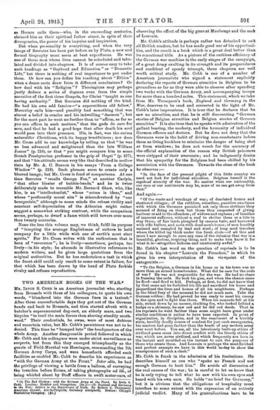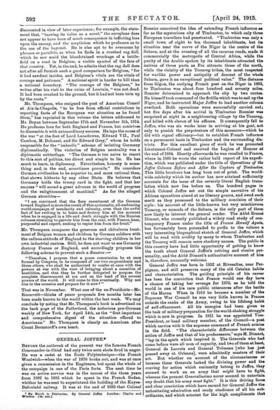TWO AMERICAN BOOKS ON THE WARE
Ma. lameS. COBB is an American journalist who, starting from Brussels with three of his colleagues, to quote his own words, "blundered into the German lines in a taxicab." After three uncomfortable days they got out of the German hands and back to Brussels, and then started afresh with a butcher's superannuated dog-cart, an elderly mare, and two bicycles "to trail the main forces then shoving steadily south- ward." Their credentials, he owns, were of most dubious and uncertain value, but Mr. Cobb's persistence was not to be denied. This time he "bumped into" the headquarters of the whole Army. Another disagreeable period followed in which Mr. Cobb and his colleagues were under strict surveillance as suspects, but from this they emerged triumphantly as the guests of Field-Marshal von Heeringen, commanding the 7th German Army Corps, and were henceforth afforded such facilities as enabled Mr. Cobb to describe his experiences as "with the German Army at the Front." later alia, he had the privilege of viewing a battle from a balloon, of surveying the trenches before Reims, of taking photographs ad lib., of being whirled about by Staff officers in swift motor-ears, of • (1) The ma caret.., mita tae esrwoot Army at the Front. B Irvin S. WA. London: Hodder and Stoughton. Rueleng and ere, it the War: Zenon to the Department of Sail. By Robert J. Thompson, American Consul, Airls-Chapelle. Germany (reffigned). Boston: Chepple Dahl:Abe Company. 111.1
observing the effect of the big guns at Manbenge and the sack of Louvain.
Mr. Cobb's attitude is perhaps rather too detached to snit all British readers, but he has made good use of his opportuni- ties, and the result is a book which is a great deal better than its sensational title. As a picture of the ruthless efficiency of the German war machine in the early stages of the campaign, of a great Army exulting in its strength and its preparedness and confident of speedy triumph, these chapters are well worth critical study. Mr. Cobb is one of a number of
American journalists who signed a statement explicitly declaring the reports of German atrocities in Belgium to be groundless as far an they were able to observe after spending two weeks with the German Army, and accompanying troops for more than a hundred miles. This statement, which we take
from Mr. Thompson's book, England and Germany in the War, deserves to be read and corrected in the light of Mr. Cobb's later impressions. It is true that he declares that be saw no atrocities, and that be is still discounting " German stories of Belgian atrocities and Belgian stories of German atrocities." It is also true that he speaks with admiration of the gallant bearing, the modesty, and the humanity of individual German officers and doctors. But he does not deny that the Germans were in the habit of driving non-combatants before them as living bucklers to minimize the danger of being shot at from windows; he does not roach for the accuracy of the official explanation of the reason why British prisoners were stripped of their overcoats ; and he indignantly denies that his sympathy for the Belgians had been chilled by his association with the Germans. Towards the oloee of the book he observes:— "In the fare of the present plight of this little country we need not look for individual atrocities. Belgium herself is the capaheaf atrocity of the war. No matter what our nationality, our race or our sentiments may be, none of us can get away from that"
And again
" Of the waste and wreckage of war ; of desolated homes and shattered villages ; of the ruthless, relentless, punitive exactness with which the Germans punished not only those civilians they accused of firing on them but those they suspected of giving harbour or aid to the offender. ; of widows and orphan. ; of families of innocent sufferers, without a roof to shelter them or a bite to stay them; of fair lands ploughed by cannon balls, and harrowed with rifle bullets, and sown with dead men's bones; of men horribly maimed and mangled by lead and steel ; of long mud trenches where the killed lay thick under the fresh clods—of all this and more 1 saw enough to cure any man of the delusion that war is a beautiful, glorious, inspiring thing, and to make him know it for what it is—altogether hideous and unutterably awful."
Mr. Cobb's last word on the question of reprisals is to be found in his chapter "Louvain the Forsaken," in which he gives his own interpretation of the viewpoint of the antagonists "To the Belgian, a German in his home or in his town was no more than an armed honaebreaker. What did be care for the cods of war P He was not responsible for the war. He had no share in framing the code. He took his gun, and when the chance came he fired—and fired to kill. Perhaps, at first, he did not know that by that same act he forfeited his life and sacrificed his home and jeopardized the lives and home. of all his neighbours. Perhaps in the blind fury of the moment be did not much oars. Take the German soldier ; He had proved he was ready to meet his enemy in the open and to fight him there. When his comrade fell at his aide, struck down by an unseen, skulking foe, who lurked behind a hedge era chimney, be saw red and he did red deeds. That in hie reprisals he went farther than some might have gone under similar conditions is rather to have been expected. In point of organization, in discipline, and in the enactment of a terribly stern, terribly deadly course of conduct for just such emergencies, his masters had gone farther than the beads of any modern army ever went before. You see, all the laboriously built-up ethics of civilized peace came into direct conflict with the bloody ethics of war, which are never civilized, and which frequently are born in the instant and moulded cm the instant to snit the purposes of those who create them. And Louvain is perhaps the most finished and perfect example we have in this world today to show the consequences of such a clash."
Mr. Cobb is frank in the admission of his limitations. He describes himself as one who "spoke no French and not enough German to hurt him." He avoids all discussion of the real causes of the war; be is careful to let us know that he is only trying to tell what be saw with his own eyes and beard with his own ears. He holds "no brief for Germany," but it is obvious that the obligations of hospitality must interfere to some extent with the expression of an entirely judicial verdict. Many of his generalizations have to. be discounted in view of later experience; for example, the state- ment that, "barring its value as a scout," the aeroplane does not appear to have been of much consequence in inflicting loss upon the enemy, and the scepticism which he professes as to the use of the bayonet. He is also apt to be overcome by phrases or parallels, ae when he finds in a crushed rag doll. which be saw amid the bloodstained wreckage of a battle- field on a road in Belgium, a visible symbol of the fate of that country. Yet, in the end, he admits that the rag doll does not after all furnish such a good comparison for Belgium, "for it had sawdust insides, and Belgium's vitals are the vitals of courage and patience." A national spirit is harder to kill than a national boundary. "The courage of the Belgians," he writes after his visit to the ruins of Louvain, "was not dead. It bad been crushed to the ground, but it had not been torn up by the roots."
Mr. Thompson, who resigned the post of American Consul at Aix-la-Chapelle, "to be free from official restrictions in reporting facts of the European war situation as he found them," has reprinted in this volume the letters addressed to Mr. Bryan between September 17th and November 5th, 1914. He professes love for both England and France, but contrives to dissemble it with extraordinary success. He lays the cause of the war " at the feet of Lord Lansdowne, Edward VII., Paul Cambon, M. Delouse, and Sir Edward Grey," whom he holds responsible for the " imbecile " scheme of isolating Germany diplomatically. The violation of Belgian neutrality was a diplomatic subterfuge. "The German is too naive to resort to this sort of politica, too direct and simple to lie. He has much to learn, in diplomacy. Nevertheless, honesty is some- thing and, in the end, sometimes prevails." He considers German civilization to be superior to, and more rational than, that shown hitherto by any other State. He believes that Germany holds the trump card in the fight, and that her success "will sound a great advance in the world of progress and the enlightenment of mankind." As for the alleged German atrocities— "I am convinced that the Rory resentment of the German toward England is more the result of this systematic, all-embracing world-campaign of mendacity and calumny, even than the awful fact of her rushing in to brain and destroy him at the moment when he is engaged in a life and death struggle with the Russian colossus straining to garrote him from the rear, with France, keen, purposeful and expert, seeking to rapier him from the front" Mr. Thompson compares the generous and chivalrous treat- ment of Belgian women and children by German soldiers with the callous attitude of England to the starving children in her own industrial centres. Still, he does not want to see Germany destroy France or England, and accordingly proposes the following scheme to prevent such a disaster .— ..Therefore, I propose that a peace commission be at once formed by Congress, to be composed of our two ex-presidents and throe others, who shall be authorised to confer at once with the powers at war with the view of bringing about a cessation of hostilities, end that they be further delegated to propose the complete disarmament at sea and on the land of the several powers of the world. It will come to We eventually. Why not rise to the occasion and prepare for it now 7 "
That was in November. What one of the ex-Presidents—Mr. Roosevelt—thinks of peace proposals five months later has been made known to the world within the last week. We may conclude by noting that Mr. Thompson's book is advertised on the bank page of the Fatherland, the notorious pro-German weekly of New York, for April 14th, as the "first important and comprehensive digest of the situation offered to Americans." Mr. Thompson is clearly an American after Count Bernstorff's own heart.















































 Previous page
Previous page